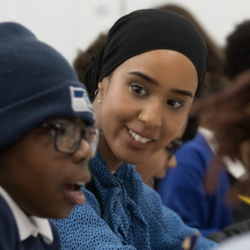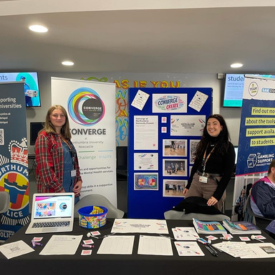-
Study
Study
Interested in studying at Northumbria? With 31,500 students, Northumbria is one of the largest universities in the country, offering courses on either a full-time, part-time or distance learning basis.
Discover more-
Undergraduate
- Undergraduate Study Degree
- Undergraduate Open Day & Events
- Application Guides
- Northumbria University UCAS Exhibitions
- Foundation Years
- Undergraduate Fees & Funding
- School & College Outreach
- Continuing Professional Development
-
Postgraduate
- Postgraduate Study Degree
- Postgraduate Research Degrees
- Postgraduate Open Days and Events
- Postgraduate Fees & Funding
- Flexible Learning
- Thinking about a Masters?
- Continuing Professional Development
- Change Direction
-
Student Life
- The Hub - Student Blog
- Accommodation
- Life in Newcastle
- Support for Students
- Careers
- Information for Parents
- Students' Union
- Northumbria Sport
-
-
International
International
Northumbria’s global footprint touches every continent across the world, through our global partnerships across 17 institutions in 10 countries, to our 277,000 strong alumni community and 150 recruitment partners – we prepare our students for the challenges of tomorrow. Discover more about how to join Northumbria’s global family or our partnerships.
Discover more-
Applying to Northumbria
- European Union
- Our London Campus
- Northumbria Pathway
- International Events
- Entry Requirements
- Agent Network
-
Northumbria Language Centre
- Faculty Requirements
- Acceptable English Requirements
- Pre-Sessional English and Study Skills
- Academic Language Skills Programmes (ALS)
-
International Fees, Funding & Scholarships
- International Undergraduate Fees
- International Undergraduate Funding
- International Masters Fees
- International Masters Funding
- International Postgraduate Research Fees
- International Postgraduate Research Funding
- International Money Matters
-
Life at Northumbria
- International student support
- The Hub - Student Blog
- Careers
-
International Mobility
- Current Northumbria Students
- Incoming Exchange Students
-
-
Business
Business
The world is changing faster than ever before. The future is there to be won by organisations who find ways to turn today's possibilities into tomorrows competitive edge. In a connected world, collaboration can be the key to success.
Discover more -
Research
Research
Northumbria is a research-rich, business-focused, professional university with a global reputation for academic quality. We conduct ground-breaking research that is responsive to the science & technology, health & well being, economic and social and arts & cultural needs for the communities
Discover more -
About Us
-
About Northumbria
- Our Strategy
- Our Staff
- Our Partners
- Student Profiles
- Alumni Profiles
- Leadership & Governance
- Academic Departments
- University Services
- History of Northumbria
- Contact us
- Online Shop
-
-
Alumni
Alumni
Northumbria University is renowned for the calibre of its business-ready graduates. Our alumni network has over 236,000 graduates based in 178 countries worldwide in a range of sectors, our alumni are making a real impact on the world.
Discover more - Work For Us
What will I learn on this module?
In this module you will develop a general understanding of tourism as both an economic and cultural practice. You will gain a basic familiarity with some of the main theories and concepts in tourism management. You will also become aware of the state of tourism in the 21st century as well as the different components that constitute the tourism complex including tourist, destinations and business.
Some of the topics you will cover include: understanding tourism, tourism demand and supply, tourist behaviour, attractions and destinations, the interrelationship between tourism, culture, Island tourism & the resort, environment and society and tourism impacts.
With this module you will develop critical, practical, academic study and information literacy skills to enable the full achievement of learning outcomes at the module and programme levels. In particular you will learn to develop a sustained reasoned argument where you research and assess theories, principles, concepts and factual information, and apply such skills in explaining and solving questions.
How will I learn on this module?
You will learn through lectures, seminars and independent learning. The two hour weekly lectures will provide you with a theoretical underpinning of the module content, relating theory to practice. The one hour weekly seminar will give you the opportunity to apply the knowledge you gained in lectures to the analysis of international tourism and to discuss critically some of the key issues in the sector.
The module will include a range of student led activities which will help you to appreciate the extent of tourism industry and its impacts, both regionally as well as internationally. Through these activities you will be equipped with skills of intellectual autonomy, collaborative working and critical and independent inquiry skills. Self- directed inquiry, autonomy and authenticity are key to your learning in this module.
Your directed study will support the work you have undertaken in the contact sessions. You will be expected to keep up-to-date with your workshop activities and readings. To aid with self-assessment on progress, a guide to these activities will be made available to you on the e-learning portal.
Independent learning time is set aside for learning activities, self-identified by you, to gain a deeper and broader knowledge of the subject.
How will I be supported academically on this module?
Support will be provided to you by a member of academic staff leading the module and providing the lecture input. Other academics will contribute to the teaching of the module based on their subject expertise. The activities of the teacher and the learner will be aligned towards the co-creation of knowledge. You will be taking responsibility for your own learning through active and self-directed learning activities that are supported by academic staff.
Your module is supported by an e-learning portal, which houses lecture materials, seminar exercise, alongside assessment details and various support facilities such as recordings of certain lectures through Panopto and IT applications, alongside other electronic support facilities such as indicated above.
You will be provided with a wide-ranging electronic reading list that comprises of academic reports, books sections and journal articles. The readings have been carefully selected to help you better understand the main concepts and ideas in tourism.
The module assessment consists of an individual essay and a group poster presentation. All the necessary information for the assessment will be uploaded to the e-learning portal prior to the deadline. This includes guide and model answers. Specific time will be allocated in class to support the assessment.
What will I be expected to read on this module?
All modules at Northumbria include a range of reading materials that students are expected to engage with. The reading list for this module can be found at: http://readinglists.northumbria.ac.uk
(Reading List service online guide for academic staff this containing contact details for the Reading List team – http://library.northumbria.ac.uk/readinglists)
What will I be expected to achieve?
Knowledge & Understanding:
• understand the nature and defining characteristics of tourism as an academic discipline as well as a sector of the economy. (MLO1)
• Appreciate and evaluate the changing role of tourism in the 21st century as well as its influences and impacts within the wider community. (MLO2)
Intellectual / Professional skills & abilities:
• Communicate effectively a reasoned argument informed by theories, concepts and factual information. (MLO3)
Personal Values Attributes (Global / Cultural awareness, Ethics, Curiosity) (PVA):
• Develop a responsible approach to learning that is underpinned by ethical values. (MLO4)
How will I be assessed?
The module assessment consists of an individual essay, counting for 75% of the mark and a group poster presentation, counting for 25% of the mark
The essay assesses your understanding of the key concepts and ideas in tourism (MLO 1, 3 and 4). You will have to choose a topic from a choice of three. Topics will be available in the e-learning portal prior to the deadline.
The group poster presentation assesses your appreciation of the changing role of tourism in contemporary societies (MLO 2, 3 and 4). The presentation on a contemporary issue of your choice should be 7 minutes long allowing 3 extra minutes for questions.
Formative assessment will be carried out on a continuous basis within the seminars. This will take place through group work, assignment discussion and reflection together with theory/practice related discussions
Pre-requisite(s)
None
Co-requisite(s)
None
Module abstract
This module provides you with a general overview of the increasingly complex and ever exciting world of tourism. The module seeks to stimulate your tourism imagination whilst minimising the stress of the experience. You will develop a clear understanding of modern thought on tourism and engage in thoughtful discussions of some of its key questions and issues. The module addresses three basic questions. First it asks how we can understand tourism both as economic and cultural practice. The second question is concerned with the extent of the tourism sector in the 21st century as well as its impacts on and influences to the wider community. The final question looks at the different components of tourism including tourists, businesses and destinations. This is a comprehensive module that emphasises the multiple connections and dimensions of tourism. With this module you will develop critical, practical, academic study and information literacy skills to enable the full achievement of learning outcomes at the module and programme levels.
Course info
Credits 20
Level of Study Undergraduate
Mode of Study 16 months
Location Singapore
City Singapore
Start September or March
All information is accurate at the time of sharing.
Full time Courses are primarily delivered via on-campus face to face learning but could include elements of online learning. Most courses run as planned and as promoted on our website and via our marketing materials, but if there are any substantial changes (as determined by the Competition and Markets Authority) to a course or there is the potential that course may be withdrawn, we will notify all affected applicants as soon as possible with advice and guidance regarding their options. It is also important to be aware that optional modules listed on course pages may be subject to change depending on uptake numbers each year.
Contact time is subject to increase or decrease in line with possible restrictions imposed by the government or the University in the interest of maintaining the health and safety and wellbeing of students, staff, and visitors if this is deemed necessary in future.
Your Learning Experience
Find out about our distinctive approach at
www.northumbria.ac.uk/exp
Admissions Terms and Conditions
northumbria.ac.uk/terms
Fees and Funding
northumbria.ac.uk/fees
Admissions Policy
northumbria.ac.uk/adpolicy
Admissions Complaints Policy
northumbria.ac.uk/complaints














